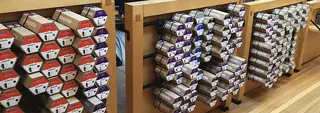
At 37, Case Scaglione is the chief conductor of the Württembergisches Kammerorchester Heilbronn and the music director of the Orchestre National d’île de France—an unusual degree of success for a conductor under 40.
Part of that success comes from paper. “I keep a personal library of pieces that I do often—I find this absolutely necessary,” Scaglione says. Here we share Scaglione’s account of how he uses paper to boost productivity and promote teamwork and collaboration.
Use paper to track your growth.
The development of a musical talent of any kind, whether it’s violin or conducting, is abstract. The only shot we have of cataloging developments or failures is the actual material—the notes on the page. Every time I come back to a score, I’m shocked at the terrible ideas I had the first time I did it. I was looking at a Beethoven symphony the other day that I had started with in college, and I thought, “My God, how did I think that this was right?” But if we didn’t have this record of our work as it goes along, there would be no way to track that development.
Use paper to remember what matters.
I use notebooks for language study. I keep getting jobs in countries where I don’t speak the language, so I’m doing a lot of that. I don’t do very much vocabulary memorization, but there are structural things that you have to hammer home, like conjugation. It’s important that you write these down. I don’t go back to the notebooks often; just the process of writing things out allows me to lay the foundation for these building blocks that make up language. I couldn’t learn languages without these journals.
Use paper to communicate.
My first dumb young conductor mistake came with doing a symphony with a renowned orchestra. I was a little scared to bring my own parts, as I thought the musicians might think I was arrogant or that I didn’t trust that they knew how it went. I decided to just wing it and use their parts. I spent half of the first rehearsal saying, “Please, brass, could you play less? Can we phrase to this place?”
Now, I mark up my score and submit it to the orchestra’s librarian, who then copies my work into the master books. From there, players will mark up their own scores on the spot with any new direction. Paper helps promote that collaboration and takes the piece from making notes to making music.
Use paper to understand your work better.
When I was in conducting school, I asked my professor, “How do you know when you know a score?” He said, “You should be able to throw a score into the air, and when it falls down open, you should have an immediate emotional reaction to the notes you see.” The way the notes look on the page has nothing to do with the music itself, but it’s forever bonded in our memory with the music.
But we do come across these points where things get difficult to learn. So I doodle; I draw doodads in the score to learn what is so difficult. Like, Well, the violins are playing an F here really high over the register—that’s strange. Somehow after that interaction with the material, it does get learned.
Inspiration is for amateurs. Some days you don’t feel like doing the job, but it doesn’t matter. You might not always feel inspired, even when you have the most amazing connection to a work. That connection comes from studying the music, so that even on the days when you’re not at your best, you’ll still be able to perform. The process of writing something down on paper gives you that emotional contact. In anything that involves passion, like music or literature, the value of having an object that contains your feeling about that material should never be underestimated. I have scores that I’ve had since I was 13. Without them, there would be a piece of me missing.



